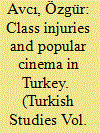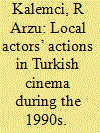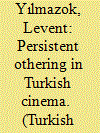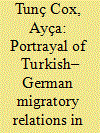| Srl | Item |
| 1 |
ID:
180537


|
|
|
|
|
| Summary/Abstract |
Arabesk is a trademark of popular culture in Turkey. At its foundation lie injuries of class, emotional wounds that society inflicts on people’s sense of dignity and freedom. Literature on arabesk has long underemphasized this salient fact. A syntagmatic and paradigmatic analysis of the narrative structure in thirty melodramas shows that the agony around which arabesk stories unfolds is rooted in class conflict. This study also reveals remarkable parallels between depictions of love in arabesk films from decades ago and the lower classes’ imagination of love today. Thereby, it provides confirmation of the importance of assessing the works of popular culture accurately if we are to better understand the psyche of their target audience in Turkey (and elsewhere in the capitalist world), which is primarily the subaltern segment of society.
|
|
|
|
|
|
|
|
|
|
|
|
|
|
|
|
| 2 |
ID:
169036


|
|
|
|
|
| Summary/Abstract |
This study analyzes changes in Turkish cinema in the 1990s. During this time, Turkish cinema was exposed to changes resulting from globalization and the foreign domination of cinema that came along with it. More recently, Turkish cinema has seen noticeable growth. By adopting a political economy perspective, this study investigates how the local actors of Turkish cinema, which were on the defensive, were able to overcome significant challenges.
|
|
|
|
|
|
|
|
|
|
|
|
|
|
|
|
| 3 |
ID:
169035


|
|
|
|
|
| Summary/Abstract |
In Turkish cinema, the regular narrative of exclusion or othering of minority ethnic, religious, and gender identities harnesses the nation-building process against groups that function as the ‘constitutive outsider.’ Although recent Turkish cinema has challenged many established cultural patterns, this challenge does not yet extend to stereotyped and heavily gendered constructions of Greek identity. In this paper, I argue that these constructions are persistent, and can be seen in recent films. Specifically, I demonstrate that Greek characters are limited to a few stereotypical names and roles, assigned heavy Turkish accents, and for the most part, confined to female roles depicted primarily as ‘indecent’ and/or objects of the male gaze.
|
|
|
|
|
|
|
|
|
|
|
|
|
|
|
|
| 4 |
ID:
169055


|
|
|
|
|
| Summary/Abstract |
Popular imagination of an age-old and very common phenomenon – migration – depends on images and stories in circulation. Mediated images of migration, refugees and diasporas play an important role in ethnic and cultural identification processes. This article explores how Turkey has accounted for its own diasporic subjects through cinematic narratives. Focusing on two salient Turkish examples from the 1980s that contradict the dominant narrative tendencies in Turkish–German/German films of the time, this article aims to present a fresh outlook. It strives to explore how these films question stereotypes and problematize essentialist readings of Turkishness and nationhood via a descriptive-interpretive analysis.
|
|
|
|
|
|
|
|
|
|
|
|
|
|
|
|